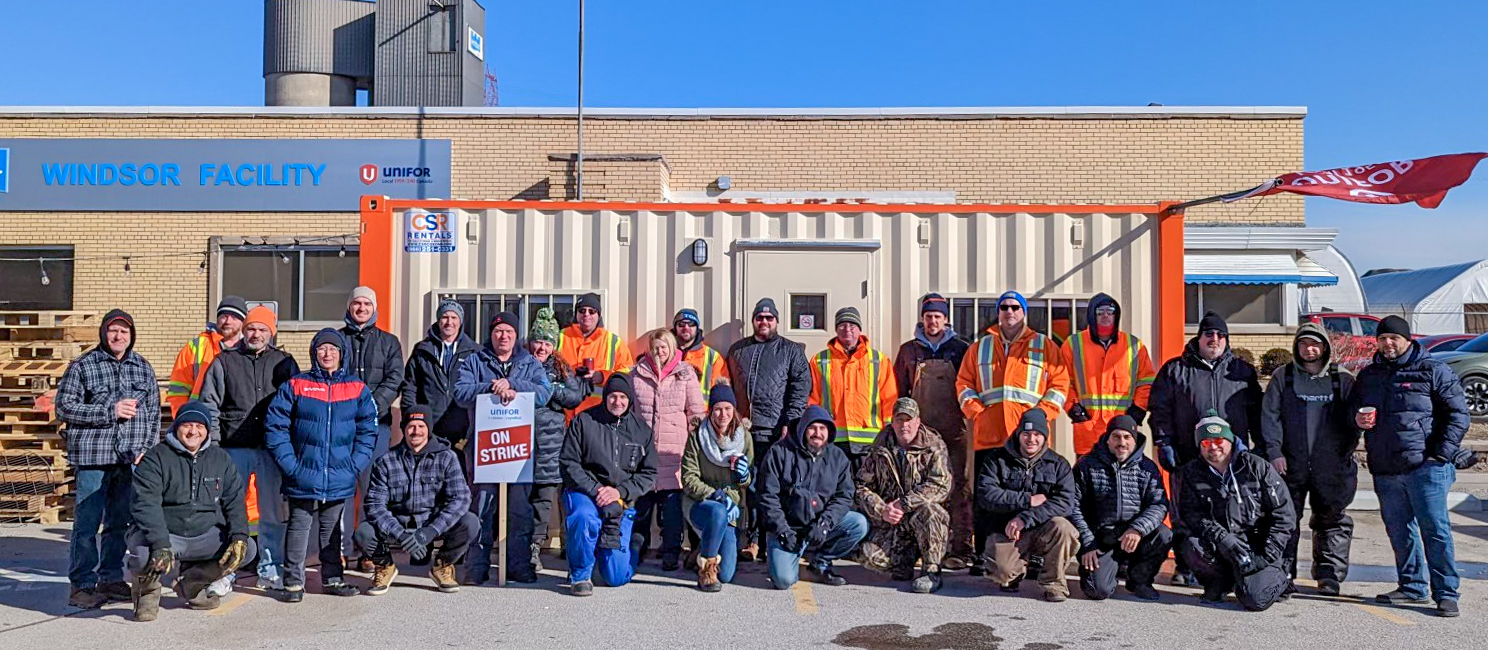February 27, 2023 - No. 8
Mining

Workers at Windsor Salt Ojibway Mine on the picket line,
February 18, 2023.
Closing of Biopharmaceutical Company in Quebec City
• Total Incoherence Due to Absence of a Public Authority
Mining
Salt Miners Strike in Windsor


Miners and community supporters block the movement of salt out
of the mine, February 23, 2022.
On February 17, 250 Windsor Salt miners represented by Unifor Local 1959 and clerical staff represented by Unifor Local 240 went on strike in Windsor, Ontario. The striking workers include miners from the Windsor Salt Ojibway Mine, which makes road salt, and workers at the evaporation processing plant, which makes food grade table salt by evaporation of brine extracted from wells.
These are the first negotiations with the company's new owners, the Los Angeles, California-based Stone Canyon Industries Holding Ltd., Mark Demetree and Affiliates which purchased all Windsor Salt operations in 2021 from K+S Aktiengesellschaft. The new owners started these negotiations with demands for contracting out of unionized jobs and then refused to negotiate, resulting in the workers going out on strike. The workers are in no mood to accept dictated concessions given concessions they have already made with the previous owners in 2014. At that time they agreed to give up their defined-benefit pension plan in return for a $300-million investment in the operation which was meant to expand production and jobs for future generations with an expansion of both the rock salt and table salt operations.
In 2016, the Ojibway Mine was expanded to extend production by
an estimated 50 years and in April 2022 the City of Windsor gave
the new owners approval to dig new brine wells for salt
extraction under Malden Park in the city's west end, extending
production at those operations for at least 30 years. When the
workers agreed to change their pension plans to a
defined-contribution plan, it was on the basis that future
generations of workers would be able to sustain the pensions
from continued and expanded production. The workers inform that
they are ready and willing to negotiate, but are not prepared to
accept the loss of workers to contracting out which will only
mean a weakening of their union and harming of the community
through the loss of union jobs.
When Stone Canyon purchased German-owned K+S Group Americas
operations in 2021 they took control of K+S Chile that operated
the open-pit Salar Grande de Tarapaca Mine in Chile's Iquique
province and Morton Salt that has operations all over the U.S.,
Canada and the Caribbean. Morton Salt was the parent company of
Windsor Salt Ltd. which besides the operations in Windsor,
Ontario has operations in other parts of Canada and Quebec.
Stone Canyon's purchase of K+S Group Americas came one year
after it purchased Kissner Group Holdings LP -- the owner of
another group of major salt operations in North America -- in
its bid to establish a larger conglomerate in the salt industry.
The new owners have set out to try and use their power over
critical salt supplies to demand concessions. Miners who worked
at Windsor Salt's mine in Pugwash, Nova Scotia, represented by
Unifor Local 823, were in negotiations when Stone Canyon bought
Windsor Salt. They reported at that time that the company began
demanding concessions to work hours, new layoff language and
changes to the pension plan. As a result of the company's
refusal to negotiate, the workers went out on strike in November
2021. Instead of negotiating, the company began stockpiling salt
in Halifax and Prince Edward Island from its other operations to
try to use their control over the salt industry in North America
to break the strike. At that time, the company claimed that it
now had "an annual production capacity of over 29 million tons
in 24 salt production facilities, 15 processing plants and 130
storage locations across North America, South America and the
Caribbean."
After two weeks on strike the Pugwash workers accepted a
tentative agreement, the terms of which were not made public.
Reports indicate that the new contract was similar to the offer
the workers initially rejected. "We had no choice. The company
kept bringing in salt the whole time we were negotiating," one
worker was quoted as saying about the new contract. Nova Scotia
MLA Elizabeth Smith-McCrossin raised concerns at the time saying
"The salt mine in Pugwash supplies road salt for the entire
province [...] I want the government to ensure in future
contracts that the salt that is used on Nova Scotia roads is
salt that is mined here in Nova Scotia. That's important because
some of the salt right now was brought in from Quebec in
anticipation [that] the strike had gone on too long."
Clearly the striking workers in Windsor, Ontario are facing an
emboldened employer which thinks it can do as it pleases in
Canada. What is most important however is that the workers are
clear that they are defending not just themselves, but future
generations and the community itself by refusing to accept the
company's dictate. They deserve everyone's support, including
local elected officials who approved the Ojibway Mine's
expansion, to make it clear that dictate will not be accepted
and that the workers and their communities must be respected.
Their claims are just and must be met!
Below is an interview with a representative of the striking workers, by Empower Yourself Now.
Closing of Biopharmaceutical Company in Quebec City
Total Incoherence Due to
Absence of
a Public Authority
In a February 3 communiqué, the Mitsubishi Chemical Group announced that it had decided to cease all operations of its subsidiary Medicago Inc., which has its head office in Quebec City. Medicago, the statement claims, is a biopharmaceutical company, said to be Canadian, specializing in the research and development of new vaccines using plant-based virus-like particle technology.
Canada invested $173 million in Medicago in 2020 to support development of the Covifenz vaccine for COVID-19 and help Medicago expand its production facility in Quebec City. Previous to this in May 2015, Quebec and Ottawa provided loans of $60 million and $8 million, respectively, for the construction of a complex in the Quebec City region to house Medicago's activities.
Innovation, Science and Industry Minister François-Philippe Champagne told reporters the federal government is in "solution mode."
"Our first order of business is really to try to find a partner who can help us preserve the jobs, preserve the technology and the intellectual property," Champagne said.
Speaking to reporters on Montreal's South Shore, Quebec's Economy Minister Pierre Fitzgibbon said "the province has had preliminary talks with potential buyers in the pharmaceutical sector to keep Medicago's expertise and skilled workforce in Quebec. He said both the Quebec and federal governments would be willing to put in money to secure a deal," news agencies report.
"We can't operate it ourselves; the government will not be the
main shareholder," Fitzgibbon said. "But if there is a
pharmaceutical company that considers it's worth continuing,
we're ready to help." He said the company informed the province
at the end of December it intended to pull the plug on Medicago.
Champagne said the federal government has legal options to
recover the $173 million it invested in the company but did not
know if the government would take measures to do so.
Medicago's Vaccine

Medicago company photo from inside its production facility
Medicago's vaccine for the prevention of COVID-19, Covifenz, was approved in Canada in February 2022 and the company was said to be preparing for the transition to commercial scale production. However, it says, "in light of significant changes to the COVID-19 vaccine landscape since the approval of Covifenz, and after a comprehensive review of the current global demand and market environment for COVID-19 vaccines and Medicago's challenges in transitioning to commercial-scale production, the Group has determined that it will not pursue the commercialization of Covifenz. In addition, the Group judged that it was not viable to continue to make further investments in the commercialization of Medicago's development products, and decided to cease all of its operations and proceed with "an orderly wind up of its business and operations."
The Mitsubishi Chemical Group also announced that it will cease all its operations at Medicago Inc., Medicago R&D Inc. and Medicago USA Inc. It says that as the sole shareholder in Medicago, the Group has decided not to make further investments in Medicago and to proceed with "an orderly wind-up" of its business and operations in Canada and in the United States. In its statement, the Group thanks "all Canadians who supported our journey, as well as the governments of Canada and Quebec, our valued business partners, suppliers, vendors, and communities."
As can be seen, all its reasons have to do with the COVID-19
vaccine and nothing is said about the need for research and
development of "new vaccines using plant-based virus-like
particle technology."
Scale of the Medicago's Project in Quebec City
The following excerpt from Medicago's website, gives an indication as to the scale of its operations in Quebec City: "Medicago's research, and product and process development activities are centralized in Quebec City, the most European city in North America, where the company operates three sites throughout the city. Its 3,000 m2 pilot plant is located alongside a 1,100 m2 greenhouse, while its headquarters, which also houses laboratories, is perched above the city. A new complex is currently under construction. The state-of-the-art facility, spreading out over 90,000 m2, will house the company's new headquarters along with operations, R&D, production and all support functions. This new facility will be capable of providing up to 1 billion pandemic vaccine doses annually."
The site also points out that Medicago USA began its operations
in 2010 through a partnership with the U.S. Defense Advanced
Research Projects Agency (DARPA).
Strengthening Canada's Biomanufacturing Sector
Medicago was one of the companies that received the lion's share of money handed out when in October 2020 the government of Canada announced it was investing $1 billion to actively pursue the purchase and development of vaccines, treatments and related supplies, as well as $1 billion in Canadian projects to strengthen Canada's biomanufacturing sector and capabilities "to fight future pandemics through leading-edge vaccine technology."
Prime Minister Justin Trudeau stated at the time: "We are supporting our biomanufacturing sector to build a country that is healthier and safer for everyone. This is why we are supporting our biomanufacturing sector through companies like Medicago and Precision NanoSystems, to develop reliable, made-in Canada vaccines."
To this end, the government established the Vaccine and Therapeutics Task Force and Biomanufacturing Subcommittee, made up of leading industry experts and scientists to advise the government on "how to address this challenge as a national priority." The task force was comprised of "multidisciplinary experts and industry leaders in the field of vaccines" -- to "provide invaluable insight, on a volunteer basis, to help the Government of Canada make sound evidence-based decisions to protect the health and safety of Canadians during the pandemic." It pointed out that, as experts with deep experience in vaccines, members of the task force may have ties to various companies in their field of expertise but that the Government of Canada has "a robust process in place to manage potential conflicts of interest."
The Canadian government also signed agreements with seven companies to secure access to their COVID-19 vaccine candidates: Medicago, AstraZeneca, Sanofi & GlaxoSmithKline, Johnson and Johnson, Novavax, Pfizer and Moderna. It stated at the time that the billion-dollar investment in vaccine procurement would "secure a domestic supply of up to 429 million doses of seven promising vaccines, representing more than 10 doses for every Canadian."
In spite of this, it proceeded to hand over millions of dollars to other companies through the $1 billion Plan to Mobilize Science and the Strategic Innovation Fund. This included:
- Supporting AbCellera's antibody therapy development in Vancouver.
- Building a new Biologics Manufacturing Centre at the Royalmount site in Montreal with the aim of producing 2 million vaccine doses a month.
- Accelerating the development of COVID-19 vaccine candidates and enhancing vaccine manufacturing facilities at the University of Saskatchewan's Vaccine and Infectious Disease Organization.
- Expanding the operations of Providence Therapeutics and Northern RNA Inc. in Calgary to design and manufacture COVID-19 vaccines and "build a pipeline of mRNA vaccines."
- Helping Vancouver-based biotechnology company Precision NanoSystems Incorporated expand Canada's capabilities in the production of RNA vaccines and future genetic medicines, while enhancing Canada's biomanufacturing capacity.
- Signing a Memorandum of Understanding with Novavax to pursue the production of its COVID-19 vaccine at the National Research Centre's Biologics Manufacturing Centre.
- Supporting clinical trials for the COVID-related vaccine candidate from Variation Biotechnologies Inc.
- Supporting 370 COVID-19 research projects including work related to vaccines at the Natural Sciences and Engineering Research Council of Canada.
- Advancing clinical development of Nova-Scotia-based IMV Inc.'s vaccine candidate with support provided through contributions from the National Research Council of Canada Industrial Research Assistance Program and the Next Generation Manufacturing Canada supercluster.
- Helping advance Precision Nano Systems Incorporated's development of a COVID-19 vaccine candidate through pre-clinical studies and clinical trials.
- Providing advisory services through the National Research
Council of Canada Industrial Research Assistance Program to
advance six vaccine candidates and one candidate drug treatment
for the following companies: Immunovaccine Technologies Inc., in
Dartmouth, Nova Scotia, for its DPX-COIVD-19 vaccine candidate;
Ento Pharmaceuticals, in Edmonton, Alberta, for its Covigenix
VAX-001 vaccine candidate; Providence Therapeutics COVID Inc.,
in Toronto, Ontario, for its PTX-COVID-19 B mRNA vaccine
candidate; Glycovax Pharma, in Montreal, Quebec, for its vaccine
candidate; Symvivo, Burnaby, in British-Columbia to advance its
bac TRL-Spike oral DNA vaccine candidate; Biodextris Inc, in
Laval, Québec, for the pre-clinical development of its nasal
COVID-19 vaccine candidate; and Arch Biopartners in Toronto,
Ontario, to advance a drug treatment candidate for organ
inflammation in severe cases of COVID-19.
Biological Innovation Potential to "Drive Economic Growth"
Among those who received millions under the Plan to Mobilize Science program was the Canadian Genomics Network (RCanGeCO), headed by Genome Canada. Genome Canada was launched in April 2020. Its role was to establish "a coordinated pan-Canadian, cross-agency network for large-scale SARS-CoV02 and human host sequencing to track viral origin, spread and evolution, characterize the role of human genetics in COVID-19 disease and to inform time-sensitive critical decision making relevant to health authorities across Canada during the pandemic" and to "build national capacity to address future outbreaks and pandemics." CanCOGeN is described as a "Canada-led consortium of Canadian federal, provincial and regional public health authorities and their healthcare partners, academia, industry, hospitals, research institutes and large-scale sequencing centres."
Recently, in Ottawa, Ontario, a new strategic partnership was announced between Genome Canada and ad Mare BioInnovations. It was stated that the partnership was struck to "drive commercialization of genomics solutions in health care, support the translation of genomics research into commercialization opportunities in health care," critical to the important shift from what is called "a disease-oriented healthcare system" to one that is "more precise, personalized, predictive, preventative and cost effective." Biological innovation has enormous potential to drive economic growth, the communiqué goes on to say.
It also points out that McKinsey Global Institute estimates the direct annual global impact of biological applications for health care at $US0.5 billion to $1.5 trillion over the 2030-40 period. The goal of the new memorandum of understanding, it adds, is to engage in concrete joint activities that will strengthen the university-to-company impact in the health care and pharmaceutical sectors, translate strong academic research into robust companies, all of which will allow it to build a robust innovation pipeline in heath care diagnostics and therapeutics, "connecting our investments and project partners with ad Mare's Commercial assessment and financial support system."
As recently as February 13, a Newswire from Hamilton, Ontario, announced that Next Generation Manufacturing Canada, the industry-led organization behind Canada's Global Innovation Cluster for Advanced Manufacturing, had received a new investment of $177 Million from the Government of Canada. The Newswire points out that the federal government's Budget 2022 "confirmed Canada's commitment to the clusters, with an additional investment of $750 million through to 2028, to support the further growth and development of Canada's Global Innovation Clusters."
With all of this Canada does not seem to be any more self-reliant as concerns biological applications for health care than during the pandemic. While the government never renders accounts for its reckless extravagance and wastefulness in the use of public resources, when it comes to treating scientific workers as expendable, it is also shameless. The problem of the 21st century is not how to solve the problems the peoples face on every front. It is to get rid of a system which deprives them of political power and the ability to control the decisions which affect their lives.
(To access articles individually click on the black headline.)
Website: www.cpcml.ca Email: editor@cpcml.ca


